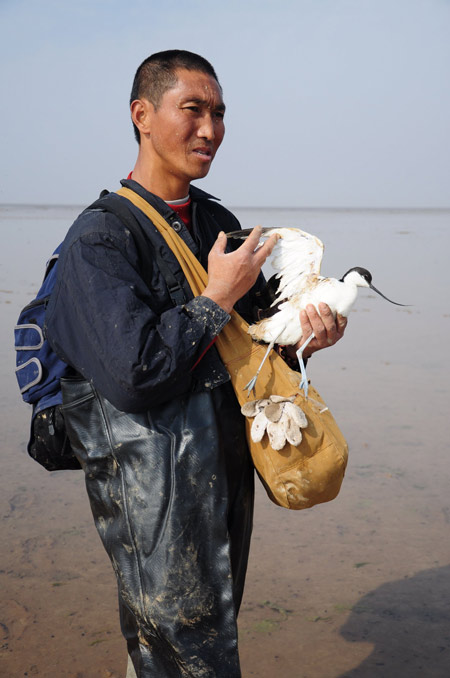Lone protector of migratory birds battle the odds
 |
|
Huang Xianyin holds an injured snipe at Poyang Lake on Friday. The injured bird was abandoned bird after it got caught in a net. |
Huang Xianyin may have heard of the idiom "kill two birds with one stone" but he is sad and angry that some of his villagers are crossing the line and slaughtering dozens of migratory birds at the same time.
Huang, 40, of Xinjian county, Jiangxi Province, is worried that migratory birds will disappear from the region despite his campaign to derail hunters from trapping the birds in Poyang Lake.
However, it has not been easy for Huang.
Even though he is affiliated to the local animal protection office, his campaign is mostly out of civic duty, he says. The hunters, who use large nets to capture and sell the birds to restaurants, have been trying to silence Huang.
"I am protecting the migratory birds according to law, but I have been living like a thief," Huang told the Global Times. "From time to time, I cut down the poles crutching those sky nets and rip up the nets. After that, I will go underground in Nanchang and hide myself because I killed their cash cow."
Huang decided to fight for the birds five years ago when he learned about the problem in China's largest freshwater lake that attracts half a million Siberian migratory wild gooses, cranes and swans in the winter.
"I could not bear the barbaric killing of wild birds any longer," Huang, told the Global Times. "No birds will fly to Poyang Lake after the next decade. We should do something for our next generation."
An unimaginable number of migratory birds are caught and killed each year, Huang said. The deadli-est threat comes from "sky net," or woven nylon strings tied to poles and then stuck into the ground. A sky net is usually three to five meters high and about one kilometer long.
"On cloudy or foggy days, the sky nets are hardly visible to birds. Once a bird flies into the net, it can never escape," Huang said. "The more it struggles, the more pain it suffers."
Black market
A 50-meter net could trap a dozen swans in one night, according to Huang.
Only swans, wild gooses and wild ducks are sold in the black market and appear on secret menus in local restaurants. Other birds often get tangled up including some rare and protected species but they are usually abandoned or kept as pets.
The lake is 3,500 square kilometers and the nets run for hundreds of meters in the winter.
Qian Fawen, an expert at the Chinese Academy of Forestry Sciences, told Guangdong-based Southern Weekend earlier that Poyang Lake is not the only dangerous place for migratory birds.
Local government said it has some "inconvenience" to reveal the number of lost migratory birds due to illegal hunting.
In the black markets, a live swan could fetch around 2,500 yuan ($375) and a live wild goose goes for 1,000 yuan ($150).
The money is attractive to the local residents who often struggle in poverty. The magazine reported that some local people make just 4,800 yuan ($721) a year. The provincial government has introduced measures to restrict fish breeding in 2003 to protect the ecology for migratory birds, pushing some residents to go after the birds.
Although Huang is a registered employee of the Wild Animal Protection and Administration of Xinjian county, he does not receive a regular salary. "From 2009 up to now, I got allowance for migratory-bird protection twice, 900 yuan ($135) each time, and another 1,200 yuan ($180) for two months' salary," Huang said.
 0
0 







Go to Forum >>0 Comments